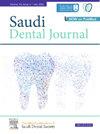Caregivers’ perceptions, beliefs and behavior influence dental caries experience in children with autism spectrum disorder: A qualitative study
IF 2.3
Q3 DENTISTRY, ORAL SURGERY & MEDICINE
引用次数: 0
Abstract
Objectives
While many children with autism spectrum disorders (ASD) experience dental caries, some of them are caries-free. This study aimed to understand the caregivers’ oral health perceptions, beliefs, and behavior that could influence dental caries experience in children with ASD.
Methods
The qualitative study was part of a study employing a mixed-methods design conducted to explore the severity and risk factors for caries experience. Individual interviews and two focus group discussions (FGD) involving caregivers of children with ASD aged 5–18 years were conducted. The caregivers’ perception of caries risks, oral care beliefs and behavior were explored. Interviews and FGDs recordings were transcribed and then analyzed thematically by two independent coders.
Results
Twenty-two caregivers provided their thoughts. The study found that caries experience was influenced by fatalistic belief, low self-efficacy and control. Caregivers of children with dental caries thought that caries is not dangerous. Caregivers experienced social pressure to provide their ASD children with what they want. Conversely, Caregivers of caries-free ASD children thought that strict commitment from an early age was needed to prevent caries.
Conclusions
Our findings support that caregivers’ perceptions, beliefs and behavior influence dental caries experience in children with ASD which might need the clinicians’ consideration.
照顾者的认知、信念和行为对自闭症谱系障碍儿童龋病经历的影响:一项定性研究
虽然许多患有自闭症谱系障碍(ASD)的儿童患有龋齿,但其中一些儿童并没有龋齿。本研究旨在了解照顾者的口腔健康观念、信念和行为对ASD儿童蛀牙经历的影响。方法采用混合方法设计探讨龋病的严重程度和危险因素,定性研究是该研究的一部分。对5-18岁ASD患儿的照顾者进行了单独访谈和两次焦点小组讨论(FGD)。探讨照顾者对龋病风险的认知、口腔护理信念及行为。访谈和fgd录音被转录,然后由两个独立的编码器按主题进行分析。结果22名护理人员提供了他们的想法。研究发现,龋病经历受宿命论信仰、低自我效能感和控制力的影响。照顾龋齿儿童的人认为龋齿并不危险。照顾者承受着为自闭症儿童提供他们想要的东西的社会压力。相反,没有龋齿的ASD儿童的看护人认为,从小就需要严格的承诺来预防龋齿。结论护理人员的认知、信念和行为影响ASD患儿的龋病经历,值得临床医生注意。
本文章由计算机程序翻译,如有差异,请以英文原文为准。
求助全文
约1分钟内获得全文
求助全文
来源期刊

Saudi Dental Journal
DENTISTRY, ORAL SURGERY & MEDICINE-
CiteScore
3.60
自引率
0.00%
发文量
86
审稿时长
22 weeks
期刊介绍:
Saudi Dental Journal is an English language, peer-reviewed scholarly publication in the area of dentistry. Saudi Dental Journal publishes original research and reviews on, but not limited to: • dental disease • clinical trials • dental equipment • new and experimental techniques • epidemiology and oral health • restorative dentistry • periodontology • endodontology • prosthodontics • paediatric dentistry • orthodontics and dental education Saudi Dental Journal is the official publication of the Saudi Dental Society and is published by King Saud University in collaboration with Elsevier and is edited by an international group of eminent researchers.
 求助内容:
求助内容: 应助结果提醒方式:
应助结果提醒方式:


